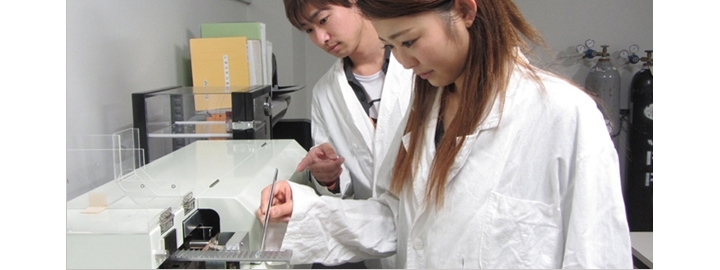Energy Conversion Division

Overview
Energy is a key element of our present highly-civilized society. There remains a strong need for energy sustainability. Establishing sustainability requires elements from all energy sources such as fossil fuels and renewable energy to perform evaluation studies on the basis of "energy conversion." It is expected that this challenge will become increasingly diversified and complicated. Aiming for the development of innovative energy systems with the intensive use of energy, the Energy Conversion Division educates and conducts research of advanced thermal engineering, fluid engineering, combustion engineering, heat and mass transfers, process engineering, and energy conversion engineering including energy conversion materials and conversion technologies, among other themes.
Laboratory introduction
For faculty member details, please see the staff introductions.
| Laboratory | Thermal engineering, energy conversion processes |
|---|---|
| Faculty members | Professor ITAYA Yoshinori Associate professor KOBAYASHI Nobusuke Assistant professor SUAMI Akira |
| Research details | With the goal of building energy systems in harmony with the environment, our laboratory conducts both basic and applied research of processes for upgrading low-quality carbonaceous energy resources, efficiency improvements of heat energy conversion and energy conservation, technologies for recovery and effective utilization of carbon dioxide, and plasma reaction processes. |
| Laboratory | Environment, energy systems |
|---|---|
| Faculty members | Professor KAMBARA Shinji Assistant professor HAYAKAWA Yukio |
| Research details | Our laboratory engages in developing purification processes of atmospheric and aquatic environments by utilizing an advanced chemical reaction method with plasma at atmospheric pressure and ultraviolet rays, and a hydrogen energy system. In addition, by applying this chemical reaction method, we are working to develop functional materials and systems for assessing efficiency and the environmental performance of thermal power generation processes. |
| Laboratory | Natural energy |
|---|---|
| Faculty members | Professor KOBAYASHI Tomonao Associate professor YOSHINO Jun |
| Research details | With the goal of promoting the introduction of natural energy sources such as solar, wind, and wave-activated power generation, our laboratory conducts basic research of observation and prediction techniques for weather and marine phenomena. Furthermore, by utilizing these techniques, we are developing applied technologies, such as evaluation of natural energy endowments and natural disaster risks. |
| Laboratory | Combustion engineering, plasma engineering |
|---|---|
| Faculty members | Professor KOMIYAMA Masaharu Associate professor NISHIDA Satoshi |
| Research details | Aiming at effective utilization of heat energy to reduce loads on the global environment utilizing various aspects of experimentation, theory, and numerical calculations, our laboratory engages in: establishing new combustion control technologies and applications with internal combustion engines; developing non-contact flame detection technology with high time-space resolution; improving fire safety by quantitative prediction of flammability limits; and creating new fields where combustion technology can be applied. |
| Laboratory | Combustion engineering |
|---|---|
| Faculty members | Professor TAKAHASHI Shuhei Assistant professor KOBAYASHI Yoshinari |
| Research details | Aiming at effective utilization of heat energy to reduce loads on the global environment utilizing various aspects of experimentation, theory, and numerical calculations, our laboratory engages in: establishing new combustion control technologies and applications with internal combustion engines; developing non-contact flame detection technology with high time-space resolution; improving fire safety by quantitative prediction of flammability limits; and creating new fields where combustion technology can be applied. |
| Laboratory | Mechanics |
|---|---|
| Faculty members | Professor MATSUMURA Yuichi Associate professor FURUYA Kohei |
| Research details | Our laboratory purposes to reduce vibration noise of mechanical structures such as automobiles, aircraft, and spacecraft, and to develop biologically-inspired machines. In consideration of new perspectives such as wave motion analysis and artificial intelligence, we conduct research of mechanics covering aspects from the fundamentals to practical applications. |
| Laboratory | Renewable energy, electric vehicles, energy conversion systems |
|---|---|
| Faculty members | Professor NAKAGAWA Tsuguhiko |
| Research details | For the purpose of resolving various energy issues, our laboratory conducts research of new systems that integrate energy conservation with renewable energy. Based on interconversion energy such as heat, electricity, and motive power, this research uses the theory of constraints to optimize energy supply from its generation to supplied use (efficiency and economy). |
| Laboratory | Fluid engineering |
|---|---|
| Faculty members | Associate professor KIKUCHI Satoshi Assistant professor LEE Keunseob |
| Research details | Our laboratory studies fluid engineering and fluid dynamics in terms of air and water flows through experimentation and numerical simulations. We aim to elucidate various phenomena of flows, such as jet flows, resistance reduction, instability, and plasma actuator-induced flows, and improve the efficiency of various equipment by controlling those phenomena. |
| Laboratory | Research and development of perovskite solar cells, evaluation of optical and electric physical properties of perovskite materials |
|---|---|
| Faculty members | Associate professor YOSHIDA Norimitsu Associate professor SOBAJIMA Yasushi |
| Research details | In order to help solve energy and environmental issues, our laboratory performs research to develop solar cells using perovskite materials, and evaluates the optical and electric physical properties of these materials. Furthermore, we study the evaluation and restoration of degradational phenomena induced by voltage in a silicone solar cell module. |

